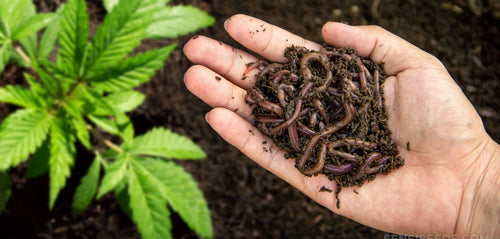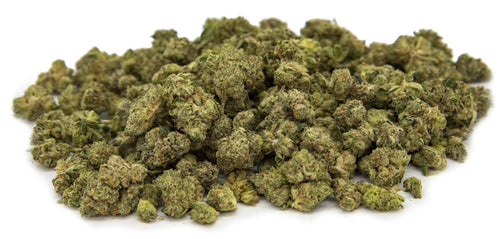#39: Patient Perspectives: Brit's Chronic Pain Journey with Cannabis
#39: Patient Perspectives: Brit's Chronic Pain Journey with Cannabis
Chronic or severe debilitating pain can cast a long, dark shadow over one's life. It's a relentless adversary that can erode the joy of living, making each day a struggle. In the midst of such adversity, however, medical cannabis has emerged as a beacon of hope, offering therapeutic relief and enhancing the quality of life for many who grapple with chronic pain.
At the heart of this narrative is Brit, a resident of Vancouver whose life has been marred by a series of health challenges. Chronic pain, fibromyalgia, endometriosis, and the aftermath of a hysterectomy are part of Brit's everyday reality.
Brit's journey into the world of persistent pain began in 2011 when she suffered a spinal fracture from a head-on collision. This unfortunate incident led Brit down the path of pain management, initially with prescription painkillers, but their were adverse effects that led to exploring the potential benefits of cannabis.
As the narrative unfolds, we learn that despite the relief offered by cannabis, Brit's pain continued to be a constant adversary. She underwent numerous tests and consultations, culminating in a diagnosis of fibromyalgia and PTSD, highlighting the intricate link between mental health and physical discomfort.
Through all these trials, Brit has found an unlikely ally in cannabis. It not only helps manage physical symptoms but also provides a sense of calm, helping alleviate Brit's constant 'fight or flight' state. As we delve deeper into the story, we'll see how cannabis has become a pivotal part of Brit's journey toward achieving a better quality of life.
The onset of pain: An accident and its aftermath
In 2011, Brit's world was turned upside down when she was involved in a devastating head-on collision. The impact fractured Brit's spine and resulted in an unrelenting world of chronic pain. As Brit recounts, "I fractured the L3 section of my spine. It was a wedge-like compression fracture and my spine crunched in on itself on the impact."

To combat the relentless pain, Brit went through six months of physiotherapy and Percocet was prescribed. The medications were somewhat effective in the short term, but they had a number of unpleasant side effects. This led Brit to explore alternative methods of pain management, including cannabis.
Brit discovered that cannabis edibles and topical applications were effective in managing pain, resulting in a reduced reliance on prescription drugs.
She recalls, "I did start using cannabis, like edibles and smoking, and finding that they were working a lot better than the Percocet they gave me. I didn't want to be taking those so I was looking to cannabis as an alternative to that."
As she explains, "Cannabis just really helped with the pain, especially the edibles. I found that I just wasn't in as much pain, and I was able to focus on things other than how much pain I was in."
The transition to cannabis marked a significant turning point in Brit's journey. The pain was still present, but instead of taking a toll on Brit's mental and physical health, it had become simply a part of life. While the pain still caused disruption in Brit's day-to-day life, cannabis was providing relief when nothing else could.
Further complications: Fibromyalgia and PTSD
As Brit navigated the turbulent waters of chronic pain management, a new challenge surfaced during the COVID-19 pandemic - a diagnosis of fibromyalgia. This disorder, characterized by widespread musculoskeletal pain accompanied by fatigue, sleep, memory, and mood issues, added another layer of complexity to Brit's health journey.

"Cannabis was helping the pain, but my pain never really went away," Brit recounts. "I can't be on my feet for more than a few hours. My back just completely locks up at that fracture. It just progressed into other pains, like neck pains, hip pains, and then I went through all the tests, the poking and prodding, and they figured out it was fibromyalgia."
This diagnosis came during a time when the world was buckling under the weight of the pandemic, with healthcare systems stretched thin and medical consultations becoming increasingly virtual. Brit recalls, "They also said that there was a PTSD piece to my pain. Some mental health challenges that accumulated from being in a fight or flight mindset."
Recognizing the link between physical pain and mental health was a pivotal moment for Brit. It underscored the need for a comprehensive approach to treatment - one that addressed not just the physical symptoms, but the emotional and psychological factors as well. As she puts it, "I think the pain and mood are so intrinsically linked. Getting a little bit of euphoria or mellowness from a joint can really affect the pain experience."
As she continues to navigate the complex landscape of chronic pain and mental health, Brit has found solace in cannabis. "It brings my mood to a level where the pain is not affecting me so much," Brit shares. "It just lets you feel a little bit more floaty and less on guard." This newfound sense of comfort was a tremendous source of relief for Brit, who now had a tool that better managed pain.
An ongoing battle: Severe menstrual pain
Brit's battle with chronic pain extended beyond the aftermath of the accident. In fact, it began much earlier, during adolescence, with a struggle that millions of women worldwide can relate to - severe menstrual pain but it was much more severe for Brit. "It progressed to the point where I was bleeding, like, 20 days out of the month."

Despite the severity of symptoms, Brit often felt dismissed by healthcare professionals. She shares, "I was told repeatedly that it was just bad period pain, something I'd have to live with." The lack of understanding and empathy added a layer of frustration to Brit's physical distress. But she remained undeterred in the quest to find relief.
It wasn't uncommon for Brit to wind up in the emergency room, writhing in agony while waiting for the pain medication to kick in. "I couldn't walk and I kept going to the ER for pain," she says. "Then in 2019, I actually just refused to leave the ER because they just kept telling me it was in my head or to take birth control."
The doctors eventually diagnosed Brit with endometriosis, a painful condition in which the tissue that normally lines the uterus grows outside of it. "They finally did a laparoscopic discovery surgery and then they discovered stage four endometriosis, and they only took about half of it because they weren't skilled surgeons, they were emergency room doctors," Brit explains.
Brit eventually saw a specialist and they performed a second surgery to remove the remaining endometriosis tissue, as well as a hysterectomy. Unfortunately, three months after the surgery, she was still in pain.
"I woke up with very alarming chest pain," Brit explains. "It was like a pressure in my chest and I couldn't breathe without screaming and had to have emergency surgery because it all got infected and my diaphragm had filled with air."
The role of cannabis: Relief and comfort from chronic pain
In Brit's quest for relief from chronic pain, she found an unlikely ally - cannabis. A natural alternative to the traditional painkillers she had been prescribed, cannabis proved effective in managing Brit's physical symptoms.
"I use a combo of topicals and ingestion and smoking, "Brit shares. "I also incorporate CBD because I know of the entourage effect and I'm pretty selective with the terpenes that I use such as myrcene, caryophyllene and limonene that are targeting pain pretty specifically."
In addition to its medical benefits, cannabis also provided Brit with a sense of comfort and security. "I would prefer to sit at home and treat with cannabis than go to the ER because I don't like the morphine they give you, I don't like the opioids, and I don't like the hospital setting. For me, I would rather sit in a THC bath, smoking a heavy indica. That's going to bring my pain down a few levels."
Brit's experience with cannabis underscores its potential as a holistic treatment option for chronic pain. Not only does it address the physical symptoms, but it also targets the underlying mental and emotional distress, providing both relief and comfort. "Even if it's maybe not the pain specifically, it's bringing my mood to a level where the pain is not affecting me so much." Brit muses.
Ultimately, Brit has learned that she can't rely on traditional treatments alone. To fully address chronic pain, she needs to take a comprehensive approach: one that combines medical interventions with alternative therapies like cannabis. It's an approach that Brit hopes will lead to a better quality of life.
A brighter future: The promise of cannabis in chronic pain management
Brit's journey through chronic pain, from severe menstrual pains to a diagnosis of fibromyalgia and suspected PTSD, paints a vivid picture of the complexities and challenges faced by many chronic pain sufferers. Each phase of Brit's journey presented its own set of trials, but through it all, she found an unexpected ally in cannabis. This natural alternative proved effective in managing Brit's physical symptoms and providing much-needed relief.
But it also brought Brit comfort and security, helping to navigate the myriad of emotional and mental health issues that accompany chronic pain. Brit's story serves to remind us of the importance of taking a comprehensive approach to chronic pain management, one that combines traditional treatments with alternative therapies such as cannabis. It's an approach that is ultimately helping Brit get closer to the goal of living a life of greater comfort and quality.
Thank you, Brit, for your resilience and courage in the face of chronic pain. Your story serves as an inspiration to us all. We wish you the best of luck in your ongoing journey.
Back to all posts










